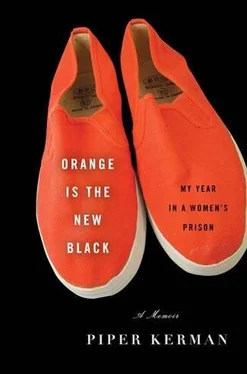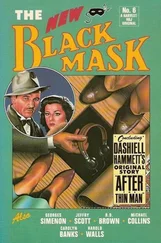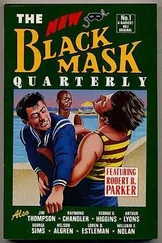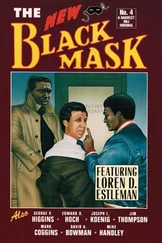She would just cock her head and smile. “You obviously have no idea what you’re talking about, Piper,” she said. “I cannot wait to get a taste, that and some dick.”
This we knew: as much as Allie loved to get high, she also loved sex. She would run filthy and hilarious commentary under her breath about any man she saw who struck her fancy-prison guard, staffer in a tie, or the occasional unsuspecting delivery guy who wandered into our field of vision.
Allie would sometimes refer to me as her “wife,” to which I would respond, “Fat fucking chance, Allie.” She occasionally experienced bursts of (I think) mock-lust, during which she would chase me around B Dorm screaming filthy things and trying to yank down my gray running shorts while I screeched. Our neighbors quickly grew irritated by our roughhousing.
From her speech and her writing, and despite her passion for Fear Factor, I could tell that Allie was better educated than most prisoners. Without asking my pal the personal questions, verboten even between friends, I had to guess that her multiple stints in prison were due to her addiction. I worried about Allie; I certainly hoped that she would never see the inside of a prison again, but more than that, I was concerned that she could end up dead.
I had similar concerns for Allie’s sidekick Pennsatucky, who had been a crack addict (I could tell from her blackened front teeth). Unlike Allie, Pennsatucky didn’t want to get high as soon as she hit the streets. She wanted to get her daughter back. The child, an angelic-looking toddler, lived with her father. Pennsatucky had no parental rights. She was “not right,” according to women around the Camp, which was something said about people who struggled with behavioral problems or sometimes outright mental illness. The conditions of the prison did not make these challenges easier.
Now that I had known Pennsatucky for a while and worked with her, I thought she had more on the ball than people gave her credit for. She was perceptive and sensitive but had great difficulty expressing herself in a way that was not off-putting to others, and she got loud and angry when she felt disrespected, which was often. There was nothing wrong with Pennsatucky that would have prevented her from living a perfectly happy life, but her problems made her vulnerable to drugs and to the men who had them on offer.
If your drug problem lands you on the wrong side of the law, you might end up detoxing on the floor of a county jail. Once you get to your long-term prison home, the first thing they’ll want to do is assess your psychiatric state… and prescribe you some drugs. The twice-daily pill line in Danbury was always long, snaking out of the medical office into the hall. Some women were helped enormously by the medication they took, but some of them seemed zombified, doped to the gills. Those women scared me; what would happen when they hit the streets and no longer could go to pill line?
When I walked through the terrifying gates of the FCI seven months before, I certainly didn’t look like a gangster, but I had a gangster mentality. Gangsters only care about themselves and theirs. My overwhelming regret over my actions was because of the trauma I had caused my loved ones and the consequences I was facing. Even when my clothes were taken away and replaced by prison khakis, I would have scoffed at the idea that the “War on Drugs” was anything but a joke. I would have argued that the government’s drug laws were at best proven ineffectual every day and at worst were misguidedly focused on supply rather than demand, randomly conceived and unevenly and unfairly enforced based on race and class, and thus intellectually and morally bankrupt. And those things all were true.
But now, when I looked in dismay at Allie, who was champing at the bit to get back to her oblivion; when I thought about whether Pennsatucky would be able to keep it together and prove herself the good mom that she aspired to be; when I worried about my many friends at Danbury whose health was crushed by hepatitis and HIV; and when I saw in the visiting room how addiction had torn apart the bonds between mothers and their children, I finally understood the true consequences of my own actions. I had helped these terrible things happen.
What made me finally recognize the indifferent cruelty of my own past wasn’t the constraints put on me by the U.S. government, nor the debt I had amassed for legal fees, nor the fact that I could not be with the man I loved. It was sitting and talking and working with and knowing the people who suffered because of what people like me had done. None of these women rebuked me-most of them had been intimately involved in the drug business themselves. Yet for the first time I really understood how my choices made me complicit in their suffering. I was the accomplice to their addiction.
A lengthy term of community service working with addicts on the outside would probably have driven the same truth home and been a hell of a lot more productive for the community. But our current criminal justice system has no provision for restorative justice, in which an offender confronts the damage they have done and tries to make it right to the people they have harmed. (I was lucky to get there on my own, with the help of the women I met.) Instead, our system of “corrections” is about arm’s-length revenge and retribution, all day and all night. Then its overseers wonder why people leave prison more broken than when they went in.
VANESSA ROBINSON was a male-to-female transsexual who had started her bid down the hill in the FCI. Within the confines of the Danbury plantation, her presence was notorious; the COs insisted on calling her “Richard,” her birth name. One day the Camp was abuzz. “The he-she is coming up!!!”
There was great anticipation of Miss Robinson’s arrival. Some women swore that they would not speak to her; others professed fascination. The West Indian women and some of the Spanish mamis expressed disgust; the born-agains made outraged noises; and the middle-class white women looked bemused or nervous. The old-timers were blasé. “Ah, we used to have a bunch of girls that were trying to go the other way. They were protesters,” said Mrs. Jones.
“The other way?” I asked.
“Go from a girl to a boy, always bitching about their medication and bullshit,” she said, with a dismissive wave of her hand.
I soon got my first glimpse of Vanessa-all six feet, four inches of blond, coffee-colored, balloon-breasted almost-all-woman that she was. An admiring crowd of young women had gathered around her, and she lapped up the attention. This was no unassuming “shim” unfortunately incarcerated and trying to get along; Vanessa was a full-blown diva. It was as if someone had shot Mariah Carey through a matter-disrupter and plunked her down in our midst.
Diva though she was, Vanessa had the intelligence and maturity to handle her new situation with some discretion. She began her time in the Camp almost demurely, with no histrionics. Several other women had come up from the FCI with her, including a startlingly beautiful young woman named Wainwright who was her bosom buddy-they both sang in the church choir. Wainwright was petite, with green cat eyes, an enigmatic smile, and a college education-most of the other black women worshipped her on sight. They were a visually hilarious pair, similar-looking in theory and yet so dramatically different.
For their first several weeks in the Camp they hung together most of the time. Vanessa was friendly if approached but more reserved than her reputation and appearance would suggest. She went to work in the kitchen. “He can’t cook,” scoffed Pop, who fell into the “disgusted” category and was disinclined to be kind, although there was some truth in her culinary assessment. There was a ketchup-in-the-marinara-sauce episode that had the whole Camp up in arms. Pop hissed into my ear who the culprit was, but I kept it to myself.
Читать дальше












